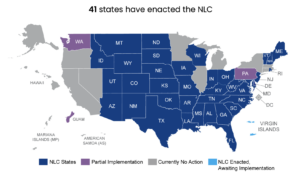As a travel nurse, obtaining and maintaining the proper licenses is essential for a successful career. However, license requirements vary by state and can be complex to navigate. In this article, we will explore the different travel nurse license requirements and provide guidance on how to fulfill them.
Key Takeaways
- Travel nurse licenses vary by state and can have specific requirements.
- Continuing education is necessary for license renewal.
- Specialty certifications can enhance career opportunities.
- Cross country licensure, advanced practice licenses, and emergency licenses are available for travel nurses.
- Staying informed about changes in license requirements is crucial.
State-by-State Guide to Travel Nurse Licensure Requirements
As a travel nurse, it’s important to understand the specific license requirements for each state where you plan to work. The process and fees for obtaining a license can vary from state to state, and certain states may have additional requirements or restrictions for travel nurses. To help you navigate this process, here’s a state-by-state guide to travel nurse license requirements:
| State | License Requirements | Application Process | Fees |
|---|---|---|---|
| California | Active California RN license | Apply through the California Board of Registered Nursing | $300 application fee plus additional fees for background checks and transcripts |
| Florida | Active Florida RN license and completion of a Florida Board of Nursing-approved course in human immunodeficiency virus (HIV) and acquired immune deficiency syndrome (AIDS) | Apply through the Florida Board of Nursing | $110 application fee |
| Texas | Active Texas RN license and completion of a Texas Board of Nursing-approved course in jurisprudence | Apply through the Texas Board of Nursing | $186 application fee |
| New York | Active New York RN license and completion of a New York State Education Department-approved course in child abuse identification and reporting | Apply through the New York State Education Department | $143 registration fee |
Note that this table is only a brief overview, and you should always check with the specific state nursing board for the most up-to-date and accurate information regarding license requirements and fees. It’s also important to keep in mind that some states participate in the enhanced Nurse Licensure Compact (ENIC), which allows travel nurses to work in multiple states under one license.
By understanding the license requirements for each state where you plan to work, you can ensure that you have the necessary documentation and take the appropriate steps to obtain a license before beginning your travel nursing assignment.
Understanding the Compact License for Travel Nurses
As a travel nurse, obtaining a license in each state you work in can be a time-consuming and complicated process. Fortunately, the Nurse Licensure Compact (NLC) offers a solution for streamlined licensing. The compact license allows nurses to work in multiple states that are members of the NLC under one license.
The compact license benefits travel nurses by reducing the wait time for licensing, decreasing the cost of licensing, and simplifying the application process. It also provides greater flexibility and increased job opportunities.
The states that participate in the NLC include:
| State | Date Joined |
|---|---|
| Arizona | January 2002 |
| Arkansas | January 2002 |
| Colorado | July 2007 |
| Delaware | July 2002 |
| Florida | January 2000 |
| Georgia | January 2007 |
| Idaho | April 2001 |
| Indiana | July 2000 |
| Iowa | July 2000 |
| Kansas | July 2006 |
| Kentucky | January 2007 |
| Louisiana | July 2001 |
| Maine | January 2000 |
| Maryland | January 2000 |
| Mississippi | January 2003 |
| Missouri | January 2000 |
| Montana | July 2007 |
| Nebraska | January 2001 |
| New Hampshire | July 2003 |
| New Jersey | July 2001 |
| New Mexico | July 2003 |
| North Carolina | July 2000 |
| North Dakota | July 2000 |
| Oklahoma | February 2004 |
| Oregon | July 2001 |
| Pennsylvania | July 2000 |
| Rhode Island | July 2003 |
| South Carolina | July 2001 |
| South Dakota | July 2000 |
| Tennessee | July 2000 |
| Texas | January 2000 |
| Utah | July 2000 |
| Virginia | January 2000 |
| West Virginia | July 2001 |
| Wisconsin | July 2000 |
| Wyoming | July 2003 |
To obtain a compact license, nurses must meet the following requirements:
- Hold an active RN or LPN/VN license in their primary state of residence
- Meet the home state’s qualifications for obtaining a license
- Declare a compact home state
- Adhere to the nursing practice act of the state where the patient is located
Overall, the compact license provides travel nurses with increased mobility and flexibility in their careers. It is an essential requirement that every travel nurse should be aware of.
Continuing Education for Travel Nurse License Renewal
As a travel nurse, it is vital to keep your license up-to-date and renewed to continue practicing in your chosen field. One way to fulfill the requirements for license renewal is through continuing education.
Most states require a certain number of continuing education units (CEUs) to be completed every two years as a condition for license renewal. The number of CEUs required varies by state, so it’s crucial to check your state’s specific requirements to ensure your compliance.
Travel nurses can find accredited CEU courses through various sources, including nursing associations, hospital employers, and online platforms. Online courses are particularly convenient as they can be completed from anywhere with an internet connection.
Benefits of Continuing Education
Aside from fulfilling license renewal requirements, continuing education can also provide numerous benefits for travel nurses. These benefits include:
- Enhanced Knowledge & Skills: CEUs can expand a travel nurse’s knowledge base and skill set, enabling them to provide better care to patients and potentially enhancing their career opportunities.
- Professional Development: Continuing education also offers opportunities for professional growth and networking.
- Personal Fulfillment: Gaining new knowledge and skills can be personally fulfilling and contribute to a sense of accomplishment and confidence.
Investing time and effort into continuing education can pay dividends for travel nurses in terms of both their professional development and license renewal requirements.
Specialty Certifications to Become a Travel Nurses
Travel nurses who are looking to boost their career prospects and expand their skillset should consider obtaining specialty certifications. These certifications demonstrate a nurse’s expertise in a particular area of nursing and can be obtained by meeting specific requirements and passing an exam.
There are many different specialty certifications available to travel nurses, including:
| Certification | Description |
|---|---|
| Critical Care Registered Nurse (CCRN) | Certifies a nurse’s expertise in caring for critically ill patients. |
| Emergency Nurse Practitioner (ENP) | Certifies a nurse’s expertise in emergency care and treatment. |
| Medical-Surgical Nurse Certification (RN-BC) | Certifies a nurse’s expertise in caring for medical-surgical patients. |
| Pediatric Nurse Certification (RN-BC) | Certifies a nurse’s expertise in caring for pediatric patients. |
Obtaining specialty certifications can enhance a travel nurse’s resume and make them a more competitive job candidate. Some travel nursing jobs may also require or prefer nurses with specific certifications. Additionally, these certifications can increase a travel nurse’s earning potential, as they often come with higher salaries or bonuses.
Requirements for obtaining specialty certifications vary depending on the certification. Typically, nurses must meet certain education and clinical experience requirements before being eligible to take the certification exam. Some certifications may also require ongoing education or re-certification to maintain the credential.
If you’re interested in obtaining a specialty certification as a travel nurse, start by researching the different options available and determining which certification aligns best with your career goals. From there, review the certification requirements and create a plan to meet them. Once you’ve obtained the certification, be sure to update your resume and inform your travel nurse staffing agency or employers about your new credential.
Renewing Travel Nurse Licenses You Need
As a travel nurse, it’s crucial to remain up-to-date with your license renewals to avoid any disruptions in your assignments. The first step is to understand the renewal requirements of your state of residency and any other states in which you hold licenses.
| State | Renewal Frequency | CEUs Required | Renewal Fee |
|---|---|---|---|
| California | Every two years | 30 hours | $150 |
| Texas | Every two years | 20 hours | $97 |
| Florida | Every two years | 24 hours | $110 |
Once you know the requirements, mark the renewal dates on your calendar and plan accordingly. Keep track of the number of Continuing Education Units (CEUs) you have obtained before your renewal deadline. If you don’t have the required CEUs, locate an approved program and complete the necessary coursework before the deadline.
It’s also important to have the required documentation on hand, such as your driver’s license, social security number, and professional references. Some states may also require background checks and fingerprinting as part of the renewal process.
Remember to check your state’s nursing board website periodically for any changes in renewal requirements or instructions. By being proactive about your license renewals, you can maintain your career as a successful travel nurse.
Obtaining a Cross Country License for Travel Nurse Needs
As a travel nurse, one of the most significant challenges you may face is obtaining a license that allows you to work in multiple states. Fortunately, there are options available to help you obtain a cross country license.
What is a cross country license?
A cross country license, or a multistate license, allows travel nurses to practice in multiple states without the need apply for a separate license in each state. Instead, travel nurses can apply for a license in their home state, or a state that is part of the Nurse Licensure Compact (NLC), which will then allow them to practice in other NLC states.
What is the Nurse Licensure Compact?
The Nurse Licensure Compact is an agreement among participating states to recognize each other’s nursing licenses. There are currently 34 states that participate in the NLC, with others actively pursuing membership.
How can I obtain a cross country license?
To obtain a cross country license, you must first be licensed in your home state, which must also be a member of the NLC. Once you have your license, you need to apply for an NLC license, which will allow you to practice in any participating state.
| Steps to Obtain a Cross Country License |
|---|
| 1. Confirm that your home state is a member of the NLC. |
| 2. Obtain a nursing license in your home state. |
| 3. Apply for an NLC license, which will allow you to practice in any participating state. |
| 4. Submit any required documentation and fees. |
What are the potential challenges of obtaining a cross country license?
While obtaining a cross country license can be a great solution for travel nurses, there are potential challenges to be aware of. Some states may have additional travel nurse requirements or restrictions that you must fulfill to obtain a license, such as background checks or fingerprinting. Additionally, states that are not part of the NLC may require travel nurses to apply for a separate license.
By obtaining a cross country license, you can significantly expand your job opportunities as a travel nurse. It’s important to do your research and prepare thoroughly to ensure a smooth licensure process and a successful travel nursing career.
Advanced Practice License for Travel Nurses
Travel nursing can be an excellent way to explore the many nuances within the nursing profession. Advanced practice licenses offer a way for travel nurses to obtain additional certifications and skills, allowing them to take on more challenging roles in their field.
In general, a travel nurse seeking an advanced practice license must have a current nursing license, which allows them to practice in that state. Additional requirements vary depending on the state, but often include graduate-level coursework or a master’s degree in nursing. Nurses must also have a certain amount of work experience in their area of specialty and pass the appropriate certification exam.
Obtaining an advanced practice license can lead to increased earning potential and a wider range of job opportunities. Travel nurses with these licenses can take on positions in specialized fields such as cardiology, oncology, or anesthesia. Note: If there are specific specialties, include examples.
If you’re interested in pursuing an advanced practice license, it’s essential to research the specific requirements for the state(s) where you plan to practice. Many states have different licensing requirements, and the process can be time-consuming and complex.
Consider consulting with a licensing service to ensure you have all necessary documents and meet eligibility requirements. This investment can save you time, money, and headaches in the long run.
Emergency License for Travel Nurses
In certain situations, travel nurses may need to quickly obtain an emergency license to be able to practice in another state due to natural disasters or public health crises. The process of obtaining an emergency license varies from state to state, but generally requires a travel nurse to have a valid nursing license in their home state and complete an expedited application with the appropriate state nursing board.
It’s crucial to note that an emergency license is only valid for a limited time and may have restrictions on practice, such as prohibiting travel nurses from administering medications or performing certain medical procedures. Also, some states may ask travel nurses to provide additional documentation to qualify for an emergency license, such as proof of work history or continuing education credits.
Travel nurses who may require an emergency license should check with the nursing board of the state they intend to practice in before accepting an assignment to understand the specific requirements and limitations of obtaining an emergency license in that state.
Online Continuing Education for Travel Nurses
Online continuing education courses have become increasingly popular among travel nurses due to their convenience and flexibility. Many nursing boards require a certain number of continuing education units (CEUs) for license renewal, and online courses provide an accessible option for travel nurses who may not have the time or resources to attend in-person classes.
There are numerous online platforms offering continuing education courses for travel nurses, ranging from general topics to specialized fields such as pediatrics or critical care. Some popular platforms for travel nurses include:
| Platform | Features | Cost |
|---|---|---|
| Nurse.com | Wide range of courses, CEU tracker, mobile app | Prices vary by course, package deals available |
| Elite Healthcare | Interactive courses, CEU tracker, live webinars | Prices vary by course, package deals available |
| ContinuingEducation.com | Courses for multiple healthcare professions, CEU tracker | Prices vary by course, package deals available |
It is important to choose a reputable platform that offers accredited courses recognized by nursing boards. Before enrolling in a course, travel nurses should also ensure that it aligns with their specific state’s license requirements.
Overall, online continuing education courses offer a valuable opportunity for travel nurses to enhance their skills and meet license renewal requirements in a flexible and convenient manner.
Test Preparation for Travel Nurse License Exams
Preparing for a travel nurse license exam may seem daunting, but with the right tools and resources, it can be a seamless process. To start, identify study materials that align with your learning style and needs. Whether it’s textbooks, online courses, or flashcards, make sure to prioritize materials that cover the exam content comprehensively and accurately.
Another effective method for test preparation is to take practice exams. These exams will help you assess your understanding of the material and identify areas where you may need to focus additional study time. Many websites offer practice exams specifically designed for travel nurse license exams, so be sure to explore your options.
Here are some additional tips and strategies to keep in mind when studying for your travel nurse license exam:
- Set a study schedule: Create a realistic study schedule based on your timelines and availability.
- Form a study group: Join a study group or create one with your colleagues to share ideas and support each other.
- Get organized: Keep track of your progress and notes in a centralized location to stay on top of your preparation.
Remember, passing the travel nurse license exam is an essential step towards a successful career in travel nursing. By following these tips, staying focused, and being diligent in your studies, you can increase your chances of success.
Understanding the Key Differences in Travel Nurse Licenses
As a travel nurse, it is essential to be aware of the differences between your license and a traditional nursing license.
One major difference is the scope of practice. Depending on the state, travel nurses may have a broader scope of practice or more restrictions than traditional nurses.
Another important difference is the additional requirements that travel nurses may need to fulfill, such as obtaining a compact license or maintaining multiple licenses for different states.
Note that requirements may vary from state to state, so it is crucial to research and understand the specific regulations for each location you plan to work in.
Below is a table summarizing some of the key differences between travel nurse licenses and traditional nursing licenses:
| Key Differences | Travel Nurse Licenses | Traditional Nursing Licenses |
|---|---|---|
| Scope of practice | May vary by state | Standardized |
| Compact license availability | Available in participating states | Not available |
| License requirements | May include additional state-specific requirements | Standardized |
Understanding the differences between travel nurse licenses and traditional nursing licenses is important for ensuring you are adequately prepared to meet your patients’ needs while adhering to state regulations.
Benefits of Maintaining Multiple Travel Nurse Licenses
Holding multiple travel nurse licenses can bring numerous benefits to nursing professionals. By acquiring licenses in different states, travel nurses can broaden their job opportunities, enjoy greater flexibility, and potentially increase their earning potential. Below are some key advantages of maintaining multiple travel nurse licenses:
| Benefits | Description |
|---|---|
| Diverse Job Opportunities | Having multiple licenses can open up access to more job opportunities, enabling travel nurses to work in a wider range of healthcare settings across the country. |
| Increased Flexibility | Multiple licenses allow travel nurses to follow their preferred job assignments and respond to shifting demands of the job market. They can move quickly between states and regions, without worrying about any obstacles caused by the lack of legal requirements. |
| Enhanced Compensation | As different states have different wage norms for travel nurses, possessing multiple licenses can enable travel nurses to command higher paychecks by leveraging high-demand states. |
Overall, maintaining multiple travel nurse licenses can greatly enhance professionals’ career opportunities and income potential. It is essential to stay on top of all licensure requirements for all states in which travel nurses are actively working or hoping to work. This requires time and effort on the part of travel nurses, but dedicated professionals will find that it pays off in the end.
Staying Updated on Travel Nurse License Requirements
As a travel nurse, it’s essential to stay up-to-date with license requirements and regulations to ensure smooth career progression. Here are some tips for staying informed:
- Check nursing board websites regularly for updates to regulations and license requirements.
- Join professional associations such as the American Nurses Association or the Association of periOperative Registered Nurses to stay informed on industry changes.
- Participate in online forums and social media groups for travel nurses to learn from others’ experiences and stay up-to-date on current topics.
By proactively seeking out and utilizing these resources, travel nurses can stay informed of any changes to license requirements and regulation, ensuring they remain in compliance and ready to seize career opportunities.
Exploring Additional Resources for Travel Nurse Licensing
Obtaining a travel nurse license can be a complex process, but fortunately, there are additional resources available to help simplify the journey. Our travel nursing license guide will help. Here are some useful resources to aid you in obtaining and maintaining your travel nurse license:
Websites:
- National Council of State Boards of Nursing – A great resource for travel nurses looking to stay updated on license requirements, renewals, and continuing education.
- TravelNursing.org – A comprehensive website for travel nurses that includes job listings, company reviews, and licensure information.
- Nursys – A database that allows nurses to verify their licenses in multiple states, making it easier to apply for licensure in new locations.
Books:
- The Travel Nurse’s Bible: A Guide to Everything on Travel Nursing – A comprehensive guide to travel nursing that covers everything from finding assignments to maintaining licensure.
- Fast Facts for the Travel Nurse – A quick-reference book that provides important information on licensure, regulations, and more for travel nurses.
Online Communities:
- Blue Pipes – A social networking site specifically for healthcare professionals, including travel nurses. The site offers discussion forums, job listings, and licensure information.
- The Gypsy Nurse – An online community for travel nurses that includes a job board, blog, and discussion forums where travel nurses can connect with one another.
These resources are just a few examples of the many options available to travel nurses seeking information and support for their licensure journey. Utilizing these resources can help ease the stress and uncertainty of the licensure process and help ensure a successful career in travel nursing.
Travel Nurse License Recap
Understanding the licensing requirements for travel nurses is crucial to ensuring a successful and fulfilling career in this field. By following the state-by-state guide and familiarizing yourself with the different types of licenses, you can increase your job opportunities, earning potential, and flexibility. Continuing education, specialty certifications, and multiple licenses can also enhance your career prospects.
It’s important to stay updated on changes in license requirements and regulations. Make use of additional resources, such as nursing boards, professional associations, and online communities dedicated to travel nursing.
In conclusion, managing your travel nurse license is an integral part of your career as a travel nurse. By proactively staying informed and following the necessary steps for each type of license, you can thrive in this exciting and rewarding field.
FAQ
What are travel nurse license requirements?
Travel nurse license requirements refer to the qualifications and criteria that travel nurses must meet in order to practice nursing in different states. These requirements typically include the completion of an approved nursing program, passing the national licensing exam (NCLEX), and obtaining a license from the respective state’s nursing board.
How do I navigate travel nurse license requirements?
Navigating travel nurse license requirements involves understanding the specific requirements of each state where you plan to work as a travel nurse and ensuring that you meet those requirements. It is important to research and stay updated on the different license application processes, fees, and any additional requirements or restrictions that may apply.
What is a compact nursing license (multi-state nursing license) for travel nurses?
A compact license, also known as the Nurse Licensure Compact (NLC), allows travel nurses to practice in multiple states that participate in the compact. This streamlines the licensing process for travel nurses as they only need to obtain a compact license from their primary state of residence, which then grants them practice privileges in other participating states.
How can I obtain a compact state license as a travel nurse?
To obtain a compact state nursing license as a travel nurse, you must meet the eligibility requirements set by the Nurse Licensure Compact (NLC) and hold an active and unrestricted license in your primary compact nursing state of residence. You will need to submit an application to your state’s nursing board and pay any associated fees. The board will then verify your eligibility and issue the compact license if you meet the requirements.
What is the role of continuing education in travel nurse license renewal?
Continuing education plays a critical role in travel nurse license renewal. Most states require nurses to complete a certain number of continuing education units (CEUs) within a specific time frame in order to renew their licenses. These CEUs help nurses stay updated on the latest advancements in nursing practice and ensure continued competence in their profession.
Where can I find accredited courses for continuing education as a travel nurse?
There are various sources where you can find accredited courses for continuing education as a travel nurse. These include online platforms, nursing associations, healthcare organizations, and educational institutions. It is important to choose courses that are relevant to your specialty and approved by your state’s nursing board for CEU credit.
What are specialty certifications for travel nurses?
Specialty certifications for travel nurses are additional credentials that demonstrate expertise and specialized knowledge in a particular area of nursing. These certifications go beyond the basic nursing license and can enhance career opportunities, increase earning potential, and expand your scope of practice as a travel nurse.
How can I obtain specialty certifications as a travel nurse?
The requirements for obtaining specialty certifications as a travel nurse vary depending on the specific certification you wish to pursue. Generally, they involve meeting certain clinical experience requirements, completing specialized training or education programs, and passing a certification exam. It is important to research the requirements of your desired specialty certification and follow the application process outlined by the certifying body.
What is the process for renewing travel nurse licenses?
The process for renewing travel nurse licenses typically involves submitting a renewal application to the respective state’s nursing board, paying any required fees, and providing documentation of completed continuing education units (CEUs) if applicable. It is important to keep track of license expiration dates and initiate the renewal process well in advance to ensure uninterrupted practice as a travel nurse.
How can I obtain a cross-country license as a travel nurse for Multi-State nursing?
Obtaining a cross-country license as a travel nurse involves following the licensure endorsement process. This generally requires already holding an active nursing license in one state and applying for endorsement in another state. The specific requirements and steps involved vary by state, so it is important to research and follow the guidelines set by each state’s nursing board.
What is an advanced practice license for travel nurses?
An advanced practice license for travel nurses refers to the authorization to practice as an advanced practice registered nurse (APRN) in a specific state. This license allows travel nurses with advanced nursing skills, such as nurse practitioners or clinical nurse specialists, to provide a wider range of healthcare services and take on more autonomous roles in the healthcare system.
How can I obtain an advanced practice license as a travel nurse?
The requirements for obtaining an advanced practice license as a travel nurse vary by state and depend on the specific type of advanced practice role you seek. Generally, they involve completing an accredited advanced practice nursing program, obtaining national certification in your specialty, and fulfilling any additional state-specific requirements such as clinical experience or collaborative practice agreements.
What is an emergency license for travel nurses?
An emergency license for travel nurses is a temporary license that allows nurses to quickly obtain authorization to practice in response to a natural disaster or public health crisis. These licenses are typically granted on an expedited basis to ensure immediate access to healthcare services in affected areas.
How can I obtain an emergency license as a travel nurse?
The process for obtaining an emergency license as a travel nurse varies by state and depends on the specific circumstances. Generally, it involves contacting the state’s nursing board or relevant regulatory agency and following their instructions for applying for an emergency license. It is important to note that emergency licenses are temporary and may have limitations on practice scope or duration.
What are online continuing education options for travel nurses?
Online continuing education options for travel nurses provide a convenient and flexible way to fulfill the required continuing education units (CEUs) for license renewal. These options include online courses, webinars, virtual conferences, and e-learning platforms that offer a variety of nursing-related topics and specialties.
How do I prepare for travel nurse license exams?
Preparing for travel nurse license exams involves utilizing various resources such as study materials, practice tests, and review courses. It is important to familiarize yourself with the content areas and format of the exam, create a study plan, and allocate sufficient time for focused studying to maximize your chances of success.
What are the key differences between travel nurse licenses and traditional nursing licenses?
The key differences between travel nurse licenses and traditional nursing licenses pertain to the scope of practice and the ability to practice in multiple states. Travel nurse licenses, such as compact licenses, allow nurses to practice across state lines, while traditional nursing licenses are typically restricted to one state. Additionally, travel nurse licenses may have different application processes and requirements compared to traditional licenses.
What are the benefits of maintaining multiple travel nurse licenses?
Maintaining multiple travel nurse licenses offers several benefits, including increased job opportunities, greater flexibility in choosing assignments, and the ability to work in different states without the need for additional licensure. Holding multiple licenses also demonstrates a commitment to professional growth and can enhance your earning potential as a travel nurse.
How can I stay updated on travel nurse license requirements?
Staying updated on travel nurse license requirements involves regularly checking the websites of nursing boards and regulatory agencies for any changes or updates. Joining professional nursing associations, attending conferences, and participating in online forums dedicated to travel nursing can also provide valuable insights and information on license requirements.
What additional resources are available for travel nurse licensing?
There are several additional resources available to assist travel nurses with the licensing process. These include websites such as the American Association of Colleges of Nursing (AACN) and the National Council of State Boards of Nursing (NCSBN), books on travel nursing and licensure, and online communities where travel nurses share their experiences and exchange information.






